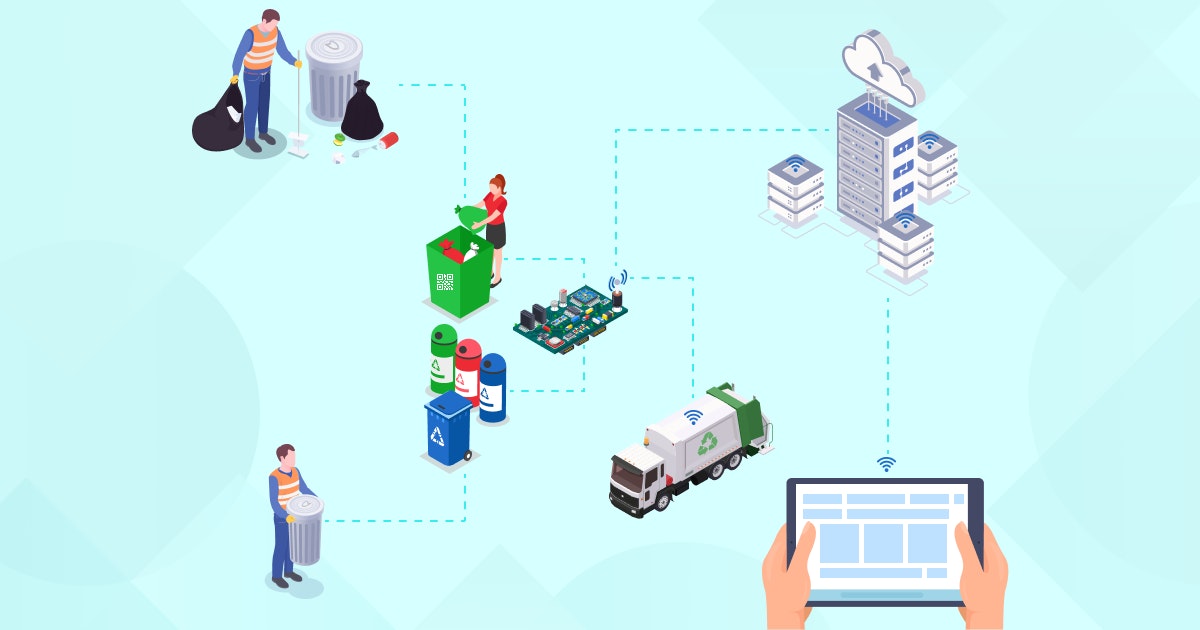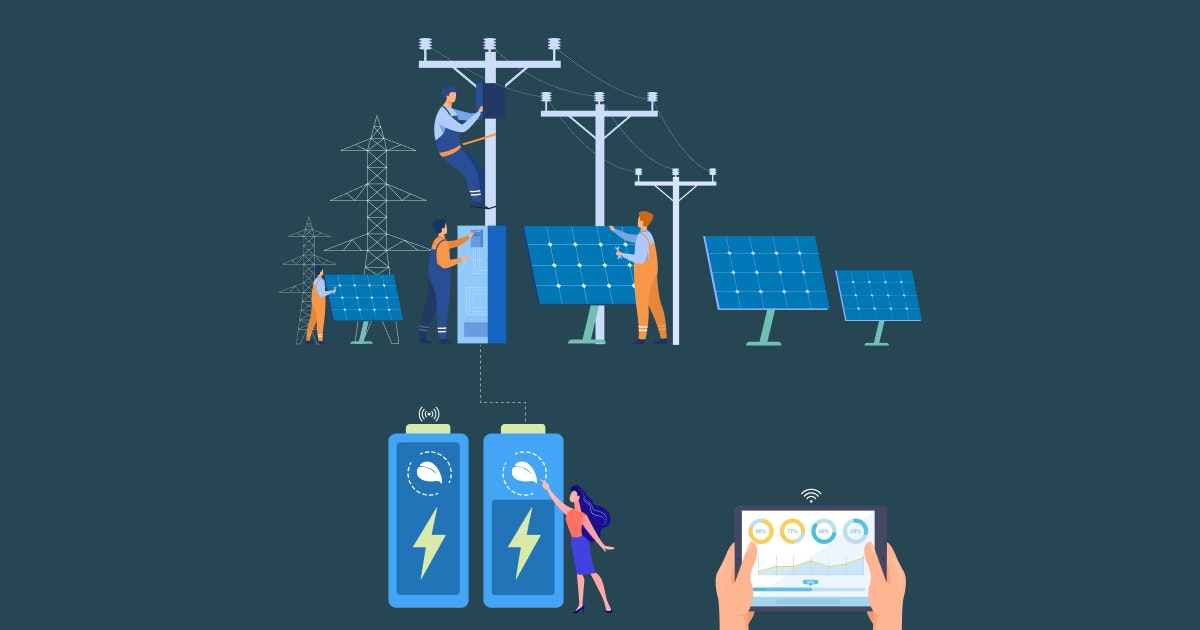Table of Content
Think of human beings, and it is not hard to think of the volumes we generate - whether industrial, commercial, agricultural, domestic, or e-waste. Do not be surprised when we tell you that the world generates 2.01 billion tonnes of municipal solid waste every year.
Unfortunately, even though tons of waste are generated momentarily, the world is yet to understand how to manage that properly fully. For starters, the waste collection processes are not efficient everywhere.
Most developed countries have cracked the code, but third-world nations are way behind. It is true that in recent years, the world has been facing an enormous problem concerning waste. Systematic efforts are required to reduce our environmental footprint.
Smart waste management needs to be incorporated into the core services provided by municipalities of every nation! Without proper waste management, there is a threat to our environment and health.
And after the 2020 Coronavirus outbreak, we do not think the world is ready for another global pandemic. However, hazardous waste could lead us to dangerous situations such as fires or even expose us to radioactivity from nuclear accidents.
Cleaner production practices can help prevent waste-related problems by preventing pollution - if only we start by taking simple steps for recycling commonly found items such as glass bottles, aluminum cans, and plastic items.
An overview of the regular waste management system
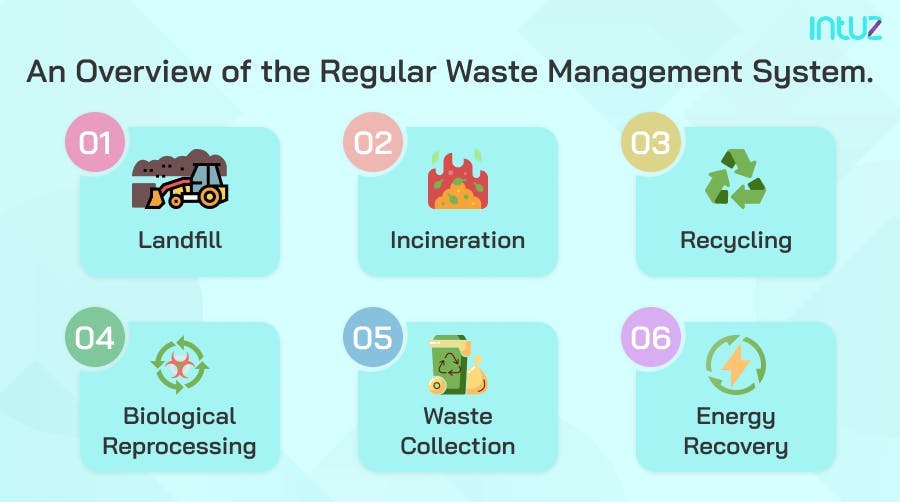
Regular waste management system
The term "waste management" refers to waste management from its inception to the final stage of disposal. There are three R's of waste management - reduce, reuse, and recycle.
We human beings have been practicing waste management techniques since our inception. Primitive beings used holes dug in sands to manually bury their fecal matter and bury other disposal products, such as bones or hair.
It was not an efficient process but enough to control the spread of diseases by rodents and carnivorous birds that thrived on these remains. The practices were modified to match up with the changes in our society.
Alternative methods were devised with the increase in the quantity of non-biodegradable waste. The use of techniques such as composting is now not just limited to gardens and farms. Many homes have also adopted it as an excellent way of recycling organic materials.
However, regular waste management processes pose a severe challenge for us. Quality recycling and garbage disposal services are missing in most societies. The administrative approach is reactive, leading to further negligence.
Only implementing what is needed for regulatory compliance is insufficient in the long run. You must think of the big picture and form legal frameworks for the benefit of the environment. Standard waste management processes include:
Are You Ready to Streamline Waste Management with Custom IoT Solutions?
Let's Get Started1. Landfill
The most common and cheapest method for waste disposal is sending it to a landfill. It is also referred to as a garbage dump or a trash site. It is a dedicated area on the ground where refuse can be stored until it is disposed of by burial, incineration, or other methods.
2. Incineration
It is a process through which waste is burnt by setting it on fire. Electricity and heat are generated, but harmful pollutants are also released into the air.
3. Recycling
It is the physical rebuilding of waste to create a new product. Metals, glass, plastic, and e-waste are usually reprocessed.
4. Biological reprocessing
Organic waste can be converted into rich soil through the composting process. It includes adding microorganisms to the fermentation process, which breaks down the waste. Similarly, Anaerobic Digestion allows treating organic waste and sludge without oxygen.
5. Waste collection
It involves the collection of domestic waste by garbage trucks, while advanced methods include automated vacuum collection.
6. Energy recovery
Processes such as combustion, pyrolyzation, gasification, and Anaerobic Digestion help convert non-recyclable waste into heat, electricity, or fuel. The process is called waste-to-energy.
Pros and cons of waste management
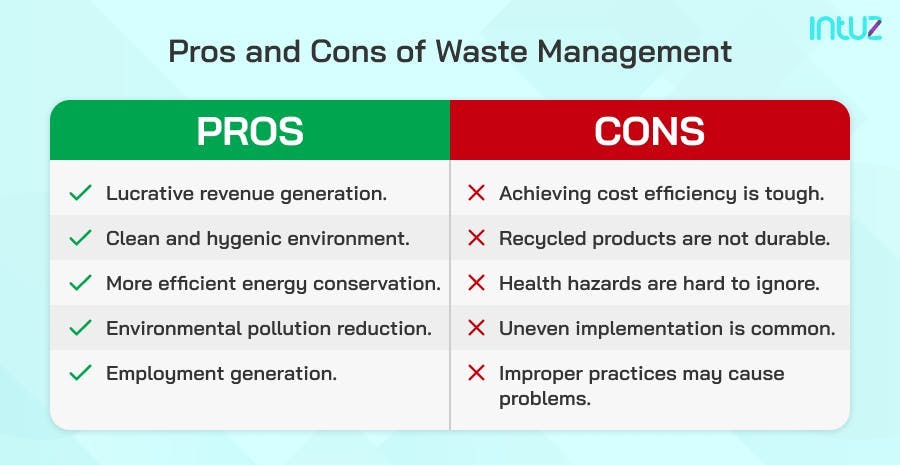
Pros and cons of waste management
Pros of proper waste management
Many of us claim to know all about waste management processes. Sure, we have made considerable strides, but waste remains a colloquial problem everywhere. But that is not what this section is about. Here, we explore the key benefits of waste management:
1. Lucrative revenue generation
The waste management industry is booming, with revenues projected to reach $2,483 billion by 2030. However, very few people take the time and invest in areas such as recycling or reusing that could reap benefits for years down the road. However, companies are ready to make long-term investments in this growing economic sector.
2. Clean and hygienic environment
The most significant advantage of waste management is that it helps keep our environment fresh, prim, and proper. Through proper waste disposal, we can maintain a disease-free society.
3. More efficient energy conservation
Recycling is advantageous for the Earth as it helps conserve precious resources such as fossil fuels and trees. Waste management, if done right, is eco-friendly, using minimal energy.
4. Environmental pollution reduction
Proper waste management can reduce the quantity and number of greenhouse gasses emitted from landfills and incinerators.
5. Employment generation
The waste management process needs a lot of workforce for collection, segregation, and other steps. The industry is estimated to be generating a lot of new jobs.
Cons of waste management
However, despite our best efforts, the damage has continued at a different rate. There are some disadvantages of waste management as well:
1. Achieving cost efficiency is tough.
A factory that processes waste needs money, time, and land to set up and run. While dumping garbage in landfills does not cost much, recycling is expensive.
2. Recycled products are not durable.
A recycled product is eco-friendly, but it has a shorter life span than the original product because it is made from other trash.
3. Health hazards are hard to ignore.
Waste management sites are susceptible to bacterial and fungal growth. They can lead to diseases among workers and may cause chemical pollution, impacting the community nearby.
4. Uneven implementation is common.
Many waste management practices are done only on a small scale and are not practiced uniformly, lowering the impact of the practice. There is a stark difference between developed and developing nations dealing with waste.
5. Improper practices may cause problems
If not appropriately deployed, waste management practices may lead to environmental threats such as chemical build-up. On the other hand, rotting garbage may lead to pollution.
An introduction to smart waste management
The global waste crisis is a major issue that increases the strain on the environment and living beings. The global annual waste generation is expected to reach 3.4 billion tonnes in the next three decades - if it is left unattended.
Therefore, many communities worldwide have turned towards smart technologies for solutions, including recycling programs or composting toilets.
What is a smart waste management system?
Smart waste management refers to any system that uses technology to make the waste collection more efficient, environmentally friendly, and affordable. Technologies such as the IoT are used in waste management systems to optimize the process.
Equipped with sensors, these systems help manage your day-to-day refuse while improving recycling rates. It enables real-time data collection and monitoring for process improvement and future innovation.
Why is smart waste management important?
The EPA reports that 75% of the waste stream in America can be recycled, but only 30% is picked up for recycling. The excess amount ends up in landfills and waterways. That causes a lot of pollution, invariably putting living beings at risk.
The fight against waste has been a long-standing one, and it is not getting over anytime soon. With a rise in population comes more waste that can not be efficiently managed through traditional systems.
That is why we need smart technologies if we want our communities' environment protected while also keeping the management costs low. Efficient recycling programs or composting efforts are expected to keep trash away from landfills.
Existing smart waste management system
In highly populated areas, rapid waste generation leads to overflowing waste bins and dirty streets. IoT-powered systems equip waste collection in real-time and notify the stakeholders of any waste overflows.
Benefits of smart waste management
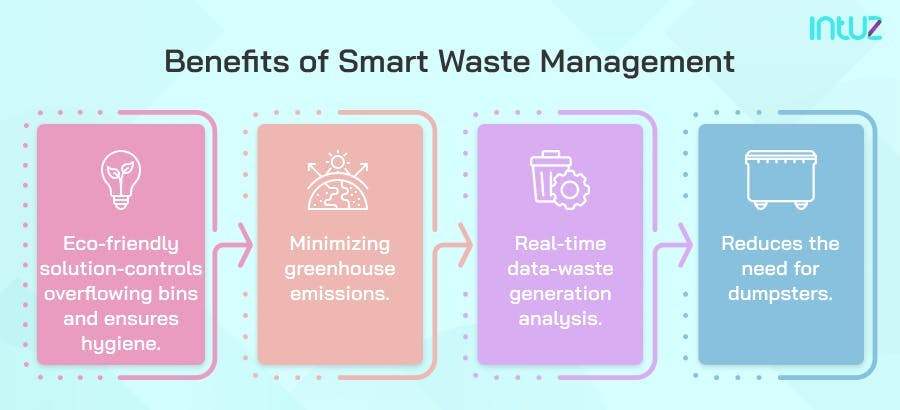
Benefits of smart waste management
A smart waste management system should not live on its own and instead adopt the principles of openness and interoperability. This includes deploying an integrated, cyber-secure network platform for hosting and managing multiple apps - from street lighting and parking management to waste collection and traffic video surveillance, and so on.
Smart waste bin management provides the following benefits:
- It offers an eco-friendly solution that controls overflowing bins and ensures hygiene.
- Garbage collection takes less time, reducing fuel usage, minimizing greenhouse emissions, and controlling traffic congestion.
- The data fetched and stored in real-time regarding waste generation analysis comes in handy for planning collection routes and bin placement.
- It reduces the need for dumpsters across the town, an arrangement that is not aesthetically pleasing and also exposes living beings to health hazards.
A Short Guide On IoT Data Collection
Learn MoreAdverse effects of improper waste management
Though we are familiar with common not-so-smart waste management methods such as incineration, landfills, recycling, energy conservation, or biological processing, we find ourselves living in a world full of waste.
Renewable energy and recycling have taken us to greater heights, but there is still scope. So, what happens when waste is not discarded correctly? The consequences of poor waste management are many and varied. Here is a list of disasters it may cause:
1. Soil contamination
Contamination can occur from the spillage and burial of hazardous components in soil. If materials such as petroleum hydrocarbons, plastics, solvents, pesticides, heavy metals, and lead are sent to landfills, they release harmful components such as carcinogens.
2. Water contamination
Water often picks up dissolved substances such as various chemicals and gasses as it moves through, leading to contamination. Even rain water gets polluted from things like cars on the street, soil that has been used for farming, or industrial waste sites. Such waters seep underground and into the reservoirs, impacting all living beings.
3. Extreme weather conditions
Greenhouse gasses are one of the most significant causes of climate change. They are created when organic matter breaks down in landfills or during composting.
They rise to the atmosphere, where it traps heat energy from escaping into space, thereby increasing the temperature of our planet. The adverse effect can be observed in storms and typhoons that cause immense damage to the ecosystem.
4. Air pollution
Global warming is a serious problem being caused due to the depletion of the ozone layer. Paper and plastic are burned at landfills, which causes greenhouse gas to be released into the atmosphere, thus contributing significantly to the damage to the ozone layer. It pollutes the air with gasses like methane, hurting the nearby human population.
5. Harm to animal and marine life
The tragic environmental effects of dumping raw or untreated sewage are apparent. Any animal life coming into contact with waste such as cigarette butts, plastic bottles, and Styrofoam gets impacted. Unadministered waste disposal is just wrong, from forming algal blooms that contaminate and eventually suffocate marine animals such as coral reefs to killing millions of animals.
6. Risk to humans
Human beings are constantly at risk in the absence of a scientific waste management system. Landfills are a major contributor to polluting the air we breathe. Fires at landfilled sites can release dangerous greenhouse gasses, such as methane and carbon dioxide. These cause cancer in humans who inhale them while working in or living near such facilities.
How does IoT help in smart waste management
Combining IoT data analytics with modern IoT solutions helps identify challenges and improve as they go. Waste management on a large scale is a challenging task, and the process can be both time-consuming and expensive.
To save money from the operational inefficiencies of traditional methods of trash collection and disposal procedures, we need IoT-driven solutions. Following is how IoT can help in smart waste management:
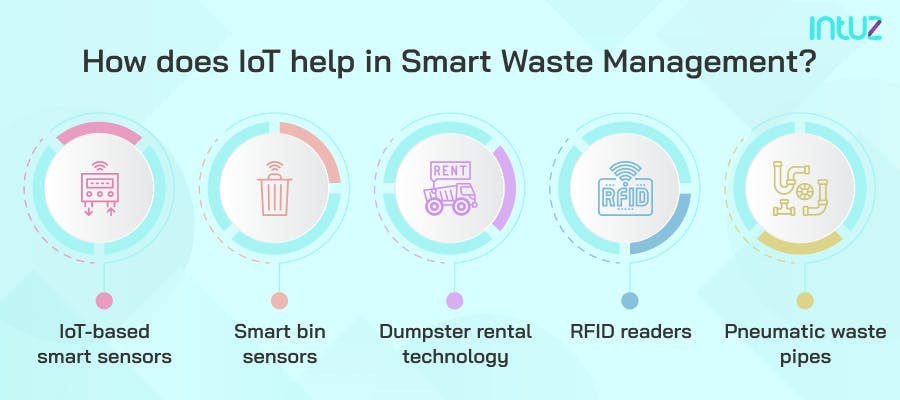
How does IoT help in smart waste management
1. IoT-based smart sensors
Ultrasonic and proximity-based sensors can be used to alert garbage collection trucks. They help detect full bins and assess segregation levels. Weight sensors and waste compactor-equipped bins can be used to track fill levels, allowing them to hold more garbage whenever required.
2. Smart bin sensors
The new smart bin technology will help keep your streets clean by stopping overflowing waste bins. The sensor sends real-time communication to streamline the filling and clearing of smart containers. It ensures that empty and clean dustbins are available to people.
The routing algorithm will smartly find the shortest route and reduce truck fuel consumption by aiding the garbage truck driver.
3. Dumpster rental technology
Skip hire or dumpster rental companies will provide you with a waste container that can be dropped off at your home, business premise, and events. The bins have inserts for easy disposal of all types unless prohibited by law.
Skips are cleaned regularly using waste management software. These are affordable options that can be leased for a fixed duration, saving you from multiple trips to the dumpsite.
4. RFID readers
RFID waste management solutions help identify and trace the flow of hazardous, non-hazardous, or recyclable materials. Tags are attached to each garbage container so that operators can monitor the sorting quality and weight of the bin and track the number of times it has been placed for collection.
5. Pneumatic waste pipes
The population increase in urban areas leads to the need for waste management solutions to accommodate rising trash amounts. Some cities take on the challenge by deploying pneumatic waste disposal bins that connect to a series of underground pipes.
Waste travels through the pipes to a waste collection plant where it can be sorted and disposed of quickly, thereby reducing energy costs and boosting overall efficiency.
IoT Device Management: Importance, Challenges, Solutions
Learn MoreImprovement of quality in urban life via smart waste management
Smart waste management is an effective solution for cities as they usually tend to overlook the need for waste management. The main challenge smart waste management solves is cost-efficiency. Waste collection costs municipalities a lot of money, and poor monitoring often results in overflowing bins.
Though a voluntary drop-off is less expensive, it is proportionately less effective. At the same time, smart waste management technologies deploy advanced technologies such as IoT to track trash levels in bins and raise alerts to avoid unhygienic conditions.
These systems also leverage blockchain technology to help the cities monetize their garbage-related data.
Implement IoT in Your Waste Management Today!
Explore SolutionsThe future of smart waste technology
Without a doubt - our future is powered by cutting-edge technology. To stay competitive, waste management businesses need to be one step ahead in the evolving industry and adopt IoT-based devices.
The arrangement will allow them to identify patterns and optimize routes for maximum fuel efficiency while reducing costs over time through data analysis. Moreover, these smart processes are practical.
For instance, bins with waste level sensors minimize the need for trash collection crews. With a steady drop in the price of sensors, it is now feasible to manufacture smart bins at scale. These advancements minimize the amount of labor and time spent on the garbage collection process.
IoT-powered smart waste management practices also make remote monitoring and end-to-end waste management easier through different platforms and mobile apps.
Book a Free 45-minute Consultation with Our IoT Experts Today! Get a customized roadmap and strategies to leverage IoT for smart waste management.
